In a recent UD thread on evidence vs selectively hyperskeptical dismissal, AS has been challenging that “religious” belief [= theism as worldview, worked into way of life] is ill founded, lacks evidence beyond testimonials, and the like. (Such is not new, already at UD I have had occasion to rebut his blanket dismissals of religious “dogma.”)
At 64, he sums up his perspective particularly succinctly:
AS, 64: I think religions have an emotional appeal that some people are more susceptible to than others. For those that succumb to that emotional need, evidence is superfluous. Those that lack that need aren’t swayed by testimony. Whether they might be impressed by evidence other than testimony is yet to be tested.
This is the old religion as a crutch fallacy.
(BTW, when I all but broke my ankle one Christmas morning as a student and had a doctor tell me I was very lucky once the X-Rays came out, I learned a lesson about crutches: when you need one, you need one real bad. Just ask the lovely and ever-cheerful Sis N, a lifelong Polio victim who walks with the aid of a pair of crutches and the most impressively muscled arms I have ever seen on a woman.)
Now, while debating theism is not the main purpose of UD, there is a matter of intellectual justice vs secularist prejudice — and even in some cases bigotry — here; the tendency to scorn theists as intellectually inferior emotional wrecks depending on unwarranted blind “faith” must be set straight.
As, BTW, John Lennox does very well here:
[youtube YPaBXf0gXNg]
Nor should the parting words of testimony as an eyewitness and chief spokesman of the 500+ witnesses at the core of the Christian contention, the Apostle Peter, about to be judicially murdered by Nero on a false charge of arson at Rome in AD 64, be ignored:
2 Peter 1:13 I think it right, as long as I am in this body, to stir you up by way of reminder, 14 since I know that the putting off of my body will be soon, as our Lord Jesus Christ made clear to me. 15 And I will make every effort so that after my departure you may be able at any time to recall these things.
16 For we did not follow cleverly devised myths when we made known to you the power and coming of our Lord Jesus Christ, but we were eyewitnesses of his majesty . . . .
19 And we have the prophetic word [E.g. Isa 53, c 700 BC] more fully confirmed, to which you will do well to pay attention as to a lamp shining in a dark place, until the day dawns and the morning star rises in your hearts, 20 knowing this first of all, that no prophecy of Scripture comes from someone’s own interpretation. 21 For no prophecy was ever produced by the will of man, but men spoke from God as they were carried along by the Holy Spirit. [ESV]
Where (given the Christian Faith is a primary target) I note, this is what Peter was talking about, vid:
[vimeo 17960119]
Or, as Barrister Frank Morison so aptly put the matter eighty plus years past now:
[N]ow the peculiar thing . . . is that not only did [belief in Jesus’ resurrection as in part testified to by the empty tomb] spread to every member of the Party of Jesus of whom we have any trace, but they brought it to Jerusalem and carried it with inconceivable audacity into the most keenly intellectual centre of Judaea . . . and in the face of every impediment which a brilliant and highly organised camarilla could devise. And they won. Within twenty years the claim of these Galilean peasants had disrupted the Jewish Church and impressed itself upon every town on the Eastern littoral of the Mediterranean from Caesarea to Troas. In less than fifty years it had began to threaten the peace of the Roman Empire . . . .
Why did it win? . . . .
We have to account not only for the enthusiasm of its friends, but for the paralysis of its enemies and for the ever growing stream of new converts . . . When we remember what certain highly placed personages would almost certainly have given to have strangled this movement at its birth but could not – how one desperate expedient after another was adopted to silence the apostles, until that veritable bow of Ulysses, the Great Persecution, was tried and broke in pieces in their hands [the chief persecutor became the leading C1 Missionary/Apostle!] – we begin to realise that behind all these subterfuges and makeshifts there must have been a silent, unanswerable fact. [Who Moved the Stone, (Faber, 1971; nb. orig. pub. 1930), pp. 114 – 115.]
Where also, we would do well to bear in mind the remarks of famed jurist (and former skeptic) Simon Greenleaf, in the opening chapter of his treatise on evidence (where, such of course includes eyewitness testimony and record of same):
Evidence, in legal acceptation, includes all the means by which any alleged matter of fact, the truth of which is submitted to investigation, is established or disproved . . . None but mathematical truth is susceptible of that high degree of evidence, called demonstration, which excludes all possibility of error [–> Greenleaf wrote almost 100 years before Godel], and which, therefore, may reasonably be required in support of every mathematical deduction.
Matters of fact are proved by moral evidence alone; by which is meant, not only that kind of evidence which is employed on subjects connected with moral conduct, but all the evidence which is not obtained either from intuition, or from demonstration. In the ordinary affairs of life, we do not require demonstrative evidence, because it is not consistent with the nature of the subject, and to insist upon it would be unreasonable and absurd.
The most that can be affirmed of such things, is, that there is no reasonable doubt concerning them.
The true question, therefore, in trials of fact, is not whether it is possible that the testimony may be false, but, whether there is sufficient probability of its truth; that is, whether the facts are shown by competent and satisfactory evidence. Things established by competent and satisfactory evidence are said to be proved.
By competent evidence, is meant that which the very-nature of the thing to be proved requires, as the fit and appropriate proof in the particular case, such as the production of a writing, where its contents are the subject of inquiry. By satisfactory evidence, which is sometimes called sufficient evidence, is intended that amount of proof, which ordinarily satisfies an unprejudiced mind, beyond reasonable doubt.
The circumstances which will amount to this degree of proof can never be previously defined; the only legal test of which they are susceptible, is their sufficiency to satisfy the mind and conscience of a common man; and so to convince him, that he would venture to act upon that conviction, in matters of the highest concern and importance to his own interest. [A Treatise on Evidence, Vol I, 11th edn. (Boston: Little, Brown, 1888) ch 1., sections 1 and 2. Shorter paragraphs added. (NB: Greenleaf was a founder of the modern Harvard Law School and is regarded as a founding father of the modern Anglophone school of thought on evidence, in large part on the strength of this classic work.)]
So, trying to sweep the report of millions of people whose lives have been transformed by meeting God off the table is patently ill-advised.
Now, too, I replied to AS initially at 165, pointing to the significance of worldview foundations:
KF, 165: Evidence and linked argument regarding the reality of God needs to be assessed in light of worldview foundations and comparative difficulties.

In that context, to blanket-dismiss the experience of millions across the world and across the ages of life-transforming encounter with the living God, is tantamount to implying general delusion of the human mind. This leads straight to self-referential incoherence. I suggest, you may find it relevant to contrast the chain and the rope. KF
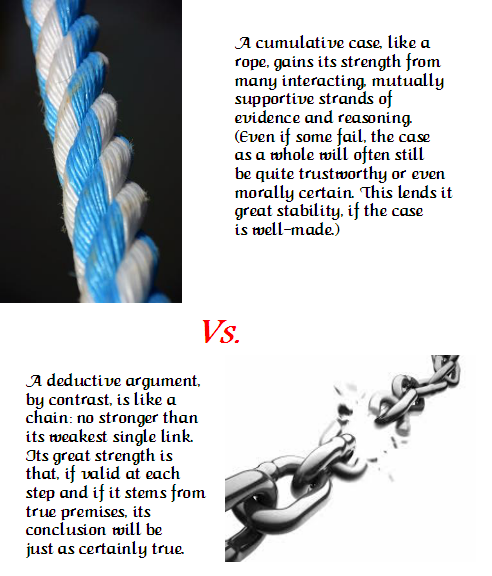
PS: I point out that evolutionary materialism credibly does entail general delusion by way of self-referential incoherence, e.g. as the well known evolutionary theorist Haldane noted:
“It seems to me immensely unlikely that mind is a mere by-product of matter. For if my mental processes are determined wholly by the motions of atoms in my brain I have no reason to suppose that my beliefs are true. They may be sound chemically, but that does not make them sound logically. And hence I have no reason for supposing my brain to be composed of atoms. In order to escape from this necessity of sawing away the branch on which I am sitting, so to speak, I am compelled to believe that mind is not wholly conditioned by matter.” [“When I am dead,” in Possible Worlds: And Other Essays [1927], Chatto and Windus: London, 1932, reprint, p.209. [–> and in response to a silly distractor, what Haldane says here is pivotal and needs to be seriously attended to and addressed on its merits.]]
In reply to this, AS went off on a tangent as to why denominations and variants of theism exist and why their adherents quarrel or even fight. To which the basic answer is obvious, we humans are factious. Then, at 176, AS repeated his challenge and dismissal of testimony, in reply to a question on what research he has recently done on religious evidence:
AS: None, recently. Where do you suggest I start, bearing in mind that testimony isn’t going to cut it for me?
Of course, this is already a clear case of selective hyperskepticism, dismissal of a cumulatively powerful category of evidence in a context where AS patently knows that eyewitness testimony on experience, is a crucial component of a lot of knowledge and decision-making. There are millions who have met and been transformed by God, so much so that in my longstanding 101 critique of evolutionary materialism as self-referentially incoherent, I noted:
c: But human thought, clearly a phenomenon in the universe, must now fit into this [a priori evolutionary materialistic] meat-machine picture. So, we rapidly arrive at Crick’s claim in his The Astonishing Hypothesis (1994): what we subjectively experience as “thoughts,” “reasoning” and “conclusions” can only be understood materialistically as the unintended by-products of the blind natural forces which cause and control the electro-chemical events going on in neural networks in our brains that (as the Smith Model illustrates) serve as cybernetic controllers for our bodies.

d: These underlying driving forces are viewed as being ultimately physical, but are taken to be partly mediated through a complex pattern of genetic inheritance shaped by forces of selection [[“nature”] and psycho-social conditioning [[“nurture”], within the framework of human culture [[i.e. socio-cultural conditioning and resulting/associated relativism]. And, remember, the focal issue to such minds — notice, this is a conceptual analysis made and believed by the materialists! — is the physical causal chains in a control loop, not the internalised “mouth-noises” that may somehow sit on them and come along for the ride.
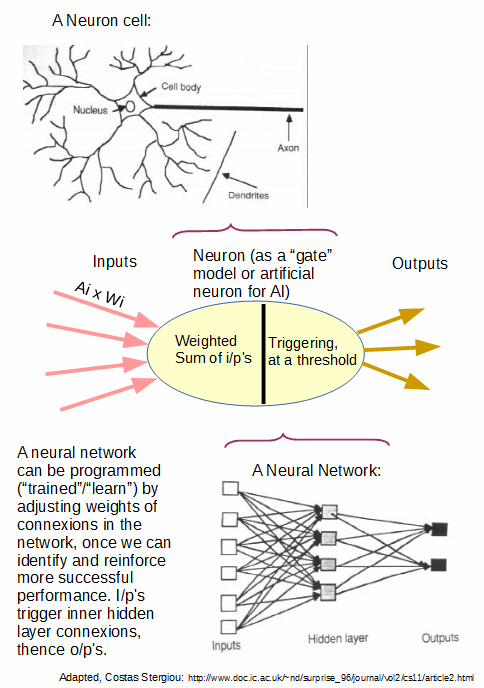
(Save, insofar as such “mouth noises” somehow associate with or become embedded as physically instantiated signals or maybe codes in such a loop. [[How signals, languages and codes originate and function in systems in our observation of such origin — i.e by design — tends to be pushed to the back-burner and conveniently forgotten. So does the point that a signal or code takes its significance precisely from being an intelligently focused on, observed or chosen and significant alternative from a range of possibilities that then can guide decisive action.])
e: For instance, Marxists commonly derided opponents for their “bourgeois class conditioning” — but what of the effect of their own class origins? Freudians frequently dismissed qualms about their loosening of moral restraints by alluding to the impact of strict potty training on their “up-tight” critics — but doesn’t this cut both ways? Should we not ask a Behaviourist whether s/he is little more than yet another operantly conditioned rat trapped in the cosmic maze? And — as we saw above — would the writings of a Crick be any more than the firing of neurons in networks in his own brain?
f: For further instance, we may take the favourite whipping-boy of materialists: religion. Notoriously, they often hold that belief in God is not merely cognitive, conceptual error, but delusion. Borderline lunacy, in short. But, if such a patent “delusion” is so utterly widespread, even among the highly educated, then it “must” — by the principles of evolution — somehow be adaptive to survival, whether in nature or in society. And so, this would be a major illustration of the unreliability of our conceptual reasoning ability, on the assumption of evolutionary materialism.
g: Turning the materialist dismissal of theism around, evolutionary materialism itself would be in the same leaky boat. For, the sauce for the goose is notoriously just as good a sauce for the gander, too.
h: That is, on its own premises [and following Dawkins in A Devil’s Chaplain, 2004, p. 46], the cause of the belief system of evolutionary materialism, “must” also be reducible to forces of blind chance and mechanical necessity that are sufficiently adaptive to spread this “meme” in populations of jumped- up apes from the savannahs of East Africa scrambling for survival in a Malthusian world of struggle for existence. Reppert brings the underlying point sharply home, in commenting on the “internalised mouth-noise signals riding on the physical cause-effect chain in a cybernetic loop” view:
. . . let us suppose that brain state A, which is token identical to the thought that all men are mortal, and brain state B, which is token identical to the thought that Socrates is a man, together cause the belief that Socrates is mortal. It isn’t enough for rational inference that these events be those beliefs, it is also necessary that the causal transaction be in virtue of the content of those thoughts . . . [[But] if naturalism is true, then the propositional content is irrelevant to the causal transaction that produces the conclusion, and [[so] we do not have a case of rational inference. In rational inference, as Lewis puts it, one thought causes another thought not by being, but by being seen to be, the ground for it. But causal transactions in the brain occur in virtue of the brain’s being in a particular type of state that is relevant to physical causal transactions. [[Emphases added. Also cf. Reppert’s summary of Barefoot’s argument here.]
AS comments:
Of course, we have just come off a century where ideologies of irreligion, atheism, materialism, scientific racism or class-ism, amorality disguising itself under the label of advancing novel rights and rescue for favoured groups [= the essence of fascism] and the like, secularism and evolutionism were used as a key part of agendas that murdered well over 100 millions, just inside states. Names such as Stalin, Pol Pot, Mao, or even Hitler (who definitively was NOT a Christian, pace too many atheistical online rants), are not to be found in the generally acknowledged lists of religious leaders. Nor is such exactly news, Plato long since warned 2350 years ago, speaking in the voice of the Athenian Stranger in The Laws bk X:
Ath. . . .[The avant garde philosophers and poets, c. 360 BC] say that fire and water, and earth and air [i.e the classical “material” elements of the cosmos], all exist by nature and chance, and none of them by art . . . [such that] all that is in the heaven, as well as animals and all plants, and all the seasons come from these elements, not by the action of mind, as they say, or of any God, or from art, but as I was saying, by nature and chance only [ –> that is, evolutionary materialism is ancient and would trace all things to blind chance and mechanical necessity] . . . . [Thus, they hold] that the principles of justice have no existence at all in nature, but that mankind are always disputing about them and altering them; and that the alterations which are made by art and by law have no basis in nature, but are of authority for the moment and at the time at which they are made.- [ –> Relativism, too, is not new; complete with its radical amorality rooted in a worldview that has no foundational IS that can ground OUGHT.] These, my friends, are the sayings of wise men, poets and prose writers, which find a way into the minds of youth. They are told by them that the highest right is might [ –> Evolutionary materialism — having no IS that can properly ground OUGHT — leads to the promotion of amorality on which the only basis for “OUGHT” is seen to be might (and manipulation: might in “spin”)], and in this way the young fall into impieties, under the idea that the Gods are not such as the law bids them imagine; and hence arise factions [ –> Evolutionary materialism-motivated amorality “naturally” leads to continual contentions and power struggles influenced by that amorality], these philosophers inviting them to lead a true life according to nature, that is, to live in real dominion over others [ –> such amoral factions, if they gain power, “naturally” tend towards ruthless abuse], and not in legal subjection to them.
But, the core issue needed some elaboration. So, at 207, I pointed to ontological and linked issues. This, I believe, should be headlined for record:
I have long since suggested that we start with the foundations of worldviews and then overnight, that we focus on a pivotal issue, root of being in a necessary being and of what character. Cf here for an outline i/l/o modes of being and ontology:
https://uncommondescent.com…..eat-being/
I must assume that you have not simply ignored a linked discussion, in haste to drum out talking points in disregard of there being another side to the story.
If you all are unable to recognise this as addressing a body of evidence on the general approaches of inference to best explanation, comparative difficulties and particularly grand sense-making, in light of evidence accessible to all who would inquire, then it shows logical, epistemological and broader philosophical impoverishment.
Which, is unsurprising.
Let me do a basic outline of key points:
1: A world, patently exists.
2: Nothing, denotes just that, non-being.
3: A genuine nothing, can have no causal capacity.
4: If ever there were an utter nothing, that is exactly what would forever obtain.
5: But, per 1, we and a world exist, so there was always something.
6: This raises the issue of modes of being, first possible vs impossible.
7: A possible being would exist if a relevant state of affairs were realised, e.g. heat + fuel + oxidiser + chain rxn –> fire (a causal process, showing fire to depend on external enabling factors)
8: An impossible being such as a square circle has contradictory core characteristics and cannot be in any possible world. (Worlds being patently possible as one is actual.)
9: Of possible beings, we see contingent ones, e.g. fires. This also highlights that if something begins, there are circumstances under which it may not be, and so, it is contingent and is caused as the fire illustrates.
10: Our observed cosmos had a beginning and is caused. This implies a deeper root of being, as necessarily, something always was.
11: Another possible mode of being is a necessary being. To see such, consider a candidate being that has no dependence on external, on/off enabling factors.
12: Such (if actual) has no beginning and cannot end, it is either impossible or actual and would exist in any possible world. For instance, a square circle is impossible,

cannot be circular and
square in the same
sense and place at the same time
. . . but there is no possible world in which twoness does not exist.
13: To see such, begin with the set that collects nothing and proceed:
{ } –> 0
{0} –> 1
{0, 1} –> 2
Etc.
14: We thus see on analysis of being, that we have possible vs impossible and of possible beings, contingent vs necessary.
15: Also, that of serious candidate necessary beings, they will either be impossible or actual in any possible world. That’s the only way they can be, they have to be in the [world-]substructure in some way so that once a world can exist they are there necessarily.
16: Something like a flying spaghetti monster or the like, is contingent [here, not least as composed of parts and materials], and is not a serious candidate. (Cf also the discussions in the linked thread for other parodies and why they fail.)

17: By contrast, God is a serious candidate necessary being, The Eternal Root of being. Where, a necessary being root of reality is the best class of candidates to always have been.
18: The choice, as discussed in the already linked, is between God as impossible or as actual. Where, there is no good reason to see God as impossible, or not a serious candidate to be a necessary being, or to be contingent, etc.
19: So, to deny God is to imply and to need to shoulder the burden of showing God impossible. [U/D April 4, 2015: We can for illustrative instance cf. a form of Godel’s argument, demonstrated to be valid:]
20: Moreover, we find ourselves under moral government, to be under OUGHT.
21: This, post the valid part of Hume’s guillotine argument (on pain of the absurdity of ultimate amorality and might/manipulation makes ‘right’) implies that there is a world foundational IS that properly bears the weight of OUGHT.
22: Across many centuries of debates, there is only one serious candidate: the inherently good, eternal creator God, a necessary and maximally great being worthy of loyalty, respect, service through doing the good and even worship.
23: Where in this course of argument, no recourse has been had to specifically religious experiences or testimony of same, or to religious traditions; we here have what has been called the God of the philosophers, with more than adequate reason to accept his reality such that it is not delusional or immature to be a theist or to adhere to ethical theism.
24: Where, ironically, we here see exposed, precisely the emotional appeal and hostility of too many who reject and dismiss the reality of God (and of our being under moral government) without adequate reason.
So, it would seem the shoe is rather on the other foot.
In the day since, there has been a tip-toe around. But, given that there has been a global challenge to the basic rationality of theists, rooted in a priori evolutionary materialist scientism, it is appropriate to headline this matter as a question on science, scientism, worldviews, cultural agendas and society. END
PS: Trollish conduct will not be tolerated. Comment at UD is a privilege on good behaviour — basic civility and what in my neck of the woods is termed broughtupcy; especially in a world where there are any number of soap boxes out there and a blog can be set up in fifteen minutes at no cost. Abuse of privilege will lead to forfeit.
PPS: It seems some notes on first rules of right reason are required:
Here we see a bright red ball on a table, marking a world partition {A | NOT_A }.
From this we can generalise to see the force of first principles of right reason:
That is, the world partition pivoting on our ball or any entity having a distinct identity immediately imposes that A is A, A is not also at the same time and in the same sense NOT_A, and that anything will either be A or not A but not both or neither. This directly applies to for instance what happens when we try to communicate. As noted in comment 98 below to P:
. . . you object using a definite, structured language based on distinct sounds and using text that is based on distinct symbols. That is already pregnant with implications that decisively undermine your argument (i.e. WJM is right). Let me go to an often neglected classical source, Paul of Tarsus, speaking to requisites of articulate, intelligible language and implications thereof:
1 Cor 14:7 If even inanimate musical instruments, such as the flute or the harp, do not give distinct notes, how will anyone [listening] know or understand what is played? 8 And if the war bugle gives an uncertain (indistinct) call, who will prepare for battle?
9 Just so it is with you; if you in the [unknown] tongue speak words that are not intelligible, how will anyone understand what you are saying? For you will be talking into empty space!
10 There are, I suppose, all these many [to us unknown] tongues in the world [somewhere], and none is destitute of [its own power of] expression and meaning. 11 But if I do not know the force and significance of the speech (language), I shall seem to be a foreigner to the one who speaks [to me], and the speaker who addresses [me] will seem a foreigner to me. [AMP]
In short, the very project of communication in symbolic language or music depends on and manifests the self evident nature of distinct identity, linked contrast and associated dichotomy. A is A (let’s use the bright red ball sitting on a table case in point I have used here at UD for years . . . I will append to OP for reference) directly distinguishes itself via a dichotomising world partition:
{ A | ~ A }
As immediately present corollaries of distinct identity (LOI), we have LNC, that A AND ~A cannot hold of the same thing and sense, and also excluded middle (LEM) by virtue of partition: A X-OR ~ A.
These are first, self evident truths that we must imply or acknowledge just in order to communicate.
So, my first, foremost point, is that it is thereafter useless to seek to dismiss the reality and presence of foundational, self evident truths.
To try to protest such is to hopelessly depend on them, it is absurd. Manifestly absurd.
The case you attempt to make collapses with literally the first word of your own, in comment no 83:
{Y | ~Y} + {o | ~o} + {u | ~u}
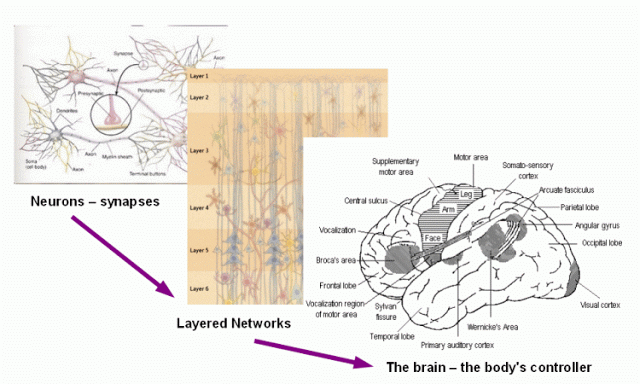

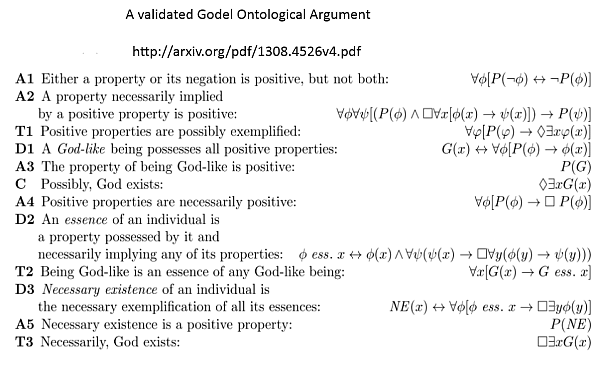

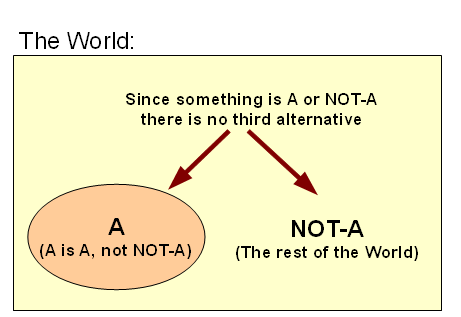
AS, 189: KF writes:
Well, “delusion” is a bit strong, but, yes, I do think people who believe that the various gods exist are mistaken. But I don’t think belief in something that is not true is per se a terrible thing. It is only when religion is used as an excuse to attack the out-group, be they infidels, women, gays and so on, that it becomes something that must be opposed.